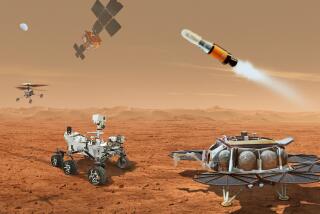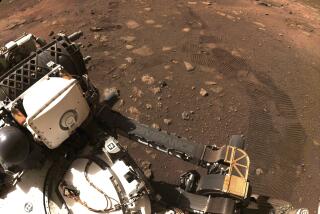Red Rover, Red Rover, Don’t Send Dana Over
This sounds faintly unpatriotic, but I don’t have much interest in Mars. Ditto for Pluto and those other planets. I know that’s wrong-headed and not very sporting, but so be it. Not wanting to explore the Red Planet and subsequently set up a Starbucks there is probably considered the equivalent of pulling the covers up over your head, which, frankly, always sounds good to me.
People from around the world have Mars on the brain these days, because a number of rockets are heading its way. NASA has launched two rovers, and two spacecraft from Europe and Japan also are en route.
The Discovery Science Center in Santa Ana has the fever too, and is offering a daylong program next Sunday for anyone who wants to learn more about the planet that has edged to within 34.7 million miles of the Earth this month. Scientists have said that puts Mars as close to Earth as it has been in 60,000 years.
In hyping its “Mars Mania” event, the Discovery Center quotes one of the featured speakers as saying, “This Mars passing is an event that won’t occur again in our lifetime. We should have a close enough look that we will see the planet’s South Pole ice caps.”
Does a Martian polar ice cap look different than Earth’s polar ice caps? More to the point, have you ever had a burning desire to see a polar ice cap? The Hubble Space Telescope last week photographed a Martian canyon wall. For people who have never seen a canyon wall in California or a number of other states, I’m sure it’ll be fascinating.
I know what you’re saying, “If Lewis and Clark thought like you, there’d be no Idaho today.”
I accept that criticism, but is overland or transoceanic travel really the same as interplanetary travel? Is there a food source waiting to be tapped up there on Mars; or perhaps a nice place to sink some roots and raise a family and a herd of cattle?
Well, we’ll never know until we get there.
Uh, right.
Mars is just Idaho waiting to happen.
Like everyone in America, I was riveted that July night in 1969 when those two guys in spacesuits stepped on the moon. And as heart-stopping as it was, the long-range effect of it was ... what, exactly?
I know, I know. It’s all about the human spirit and exploring our universe. I’m all for exploration; it is the essence of science and progress. It just seems that everything we’ve ever explored -- other lands, the plant kingdom, human genomes -- had a payoff.
We will get what, exactly, from Mars?
The Mars Society, a Colorado-based group, lists on its Web site several benefits of exploration, including the possible proof of previous life. Others are lofty goals, like doing it for the challenge, for “our humanity,” for our young people and “for the future.”
If we’d nailed down every earthly problem during our few thousand years of work on them, I’d be more inclined to turn my attention to a planet 34.7 million miles away. The two Mars rovers have been priced at $800 million -- chicken feed in the grand scheme of things -- but money that could be better spent.
I have no choice but to wait around and be proved wrong. No problem. There’s always someone who’ll say that space exploration yields new technology that eventually produced better household appliances.
If so, swell. Spend a few billion figuring out how to get there and back and use the information to build a better mousetrap.
Failing that, at least we’ll have some nice nature photos.
And in case you’re wondering, yes, I probably would have asked Columbus if he really wanted to spend that much time away from home.
*
Dana Parsons’ column appears Wednesdays, Fridays and Sundays. He can be reached at (714) 966-7821, at [email protected] or at The Times’ Orange County edition, 1375 Sunflower Ave., Costa Mesa, CA 92626.
More to Read
Sign up for Essential California
The most important California stories and recommendations in your inbox every morning.
You may occasionally receive promotional content from the Los Angeles Times.










